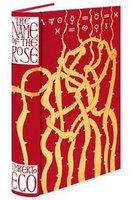 Umberto Eco's latest novel 'The Mysterious Flame of Queen Loana' is another delightful and encyclopaedic cornucopia of references, quotes and tempting diversions; this one, like all Eco's novels, almost demanding to be hyperlinked just so you can work out where he's going, and why. It's worth the effort.
Umberto Eco's latest novel 'The Mysterious Flame of Queen Loana' is another delightful and encyclopaedic cornucopia of references, quotes and tempting diversions; this one, like all Eco's novels, almost demanding to be hyperlinked just so you can work out where he's going, and why. It's worth the effort.Eco's protagonist in 'The Mysterious Flame,' an antiquarian bookseller called Yambo, has lost his personal 'episodal' memory but would still score highly in Mastermind with 'Literature' and 'Mid-Century Italian Comics & Popular Culture' as his two possible specialist subjects; Yambo seeks to rediscover himself through an attic's worth of boxes containing books, cigarette packages, magazines, comics, stamps and other miscellany -- the book includes many of the beautiful and politically incorrect illustrations mentioned in the text.
I say the book almost demands to be hyperlinked, about which Eco is delightfully aware -- in an interview with Village Voice "Eco says he structured Mysterious Flame to mimic the free-associative behavior of electronic navigation" -- and he sets the book in pre-Google 1991, requiring Yambo to rummage through his past instead of Googling it -- but a new Wiki project has taken up the challenge "to create a thorough and accurate set of annotations to Umberto Eco's latest novel," and as always with a Wiki, "anyone is free to add or modify entries."
You can just imagine his eyes twinking at the thought. "Books," he said once, "belong to those kinds of instruments that, once invented, have not been further improved because they are already alright, such as the hammer, the knife, spoon or scissors." But as a professional semiologist, he's not unaware of what his readers might be using Google to do with the signs he's made available in his book, and that's no doubt part of his plan, as the Village Voive interview suggests.
In the Eco-ian universe, books aren't merely stand-alone islands to be traversed in linear fashion; they are nodes in an exponentially expanding extranet. To read one book, you sometimes have to pass through several others, accumulating countless references and subtexts along the way. "We've been reading books in a hypertextual way ever since Homer," Eco says. "We read a page and then we jump, especially when we're rereading it. Think of the Bible. When people read it, they're always jumping here and there, constantly connecting various quotations."
 It took sixteen years to produce a published Key to 'The Name of the Rose,'Eco's first novel -- and very welcome it was too. Now we've got the beginnings of a similar project in just six months, and with the wide participation that a Wiki invites. Excellent. Says Eco of his books, "I construct Aristotelian Machines, that allow anyone to see with Words." It doesn't hurt to ask for help in order to see what he's asking you to see.
It took sixteen years to produce a published Key to 'The Name of the Rose,'Eco's first novel -- and very welcome it was too. Now we've got the beginnings of a similar project in just six months, and with the wide participation that a Wiki invites. Excellent. Says Eco of his books, "I construct Aristotelian Machines, that allow anyone to see with Words." It doesn't hurt to ask for help in order to see what he's asking you to see.You can find the Queen Loana Wiki here. And you can find the definitive Eco site here.
UPDATE: Eco's comments from a 1995 interview with 'Vogue' are priceless, and worth repeating:
People always ask me, 'How is it that your novel, which are so difficult, have a certain success?' I am offended by the question. It's as if they asked a woman, 'How can it be that men are interested in you?' Because I am beautiful, of course!" he roars. "To ask such a question insinuates that you are very ugly.
"I myself like easy books that put me to sleep immediately. But the normal reader who does not spend his day fighting with Kant or Hegel feels respected if there is a jujitsu with a novel, a resistance, a seduction. If the book says yes immediately, it is a whore. There is no challenge in seducing a whore." Only as energetic a bibliophile as Eco, it occurs to me, would regard it as the reader's job to seduce the book.
4 comments:
According to my sources, reading any Eco book instantly raises your IQ by two points.
Yes, I could see that. Having read quite a few, I'm now into double figures. :-)
Have you heard too that Ayn Rand took two years to write 'Galt's Speech' in 'Atlas,' after which she was certain that she'd increased her own IQ by at least ten points.
Haven't heard that one.
I've just started reading Umberto Eco's "The Name of the Rose". I'll let you know how my intellect prospers, if at all. To be honest, I haven't read a novel for a few years, so I may merely be reversing atrophy :-)
I just (finally) finished "The Name of the Rose" the other day. It took me two months, but I was reading it during my work breaks when I usually get other distractions as well.
Still, magnificent. I'll probably read it again a little more seriously a little further down the track. Given that it took me two months to read a book set over 7 days, I probably lost a little bit of the urgency in the book.
I'm going to read Survivor by Chuck Palahniuk now.
Post a Comment